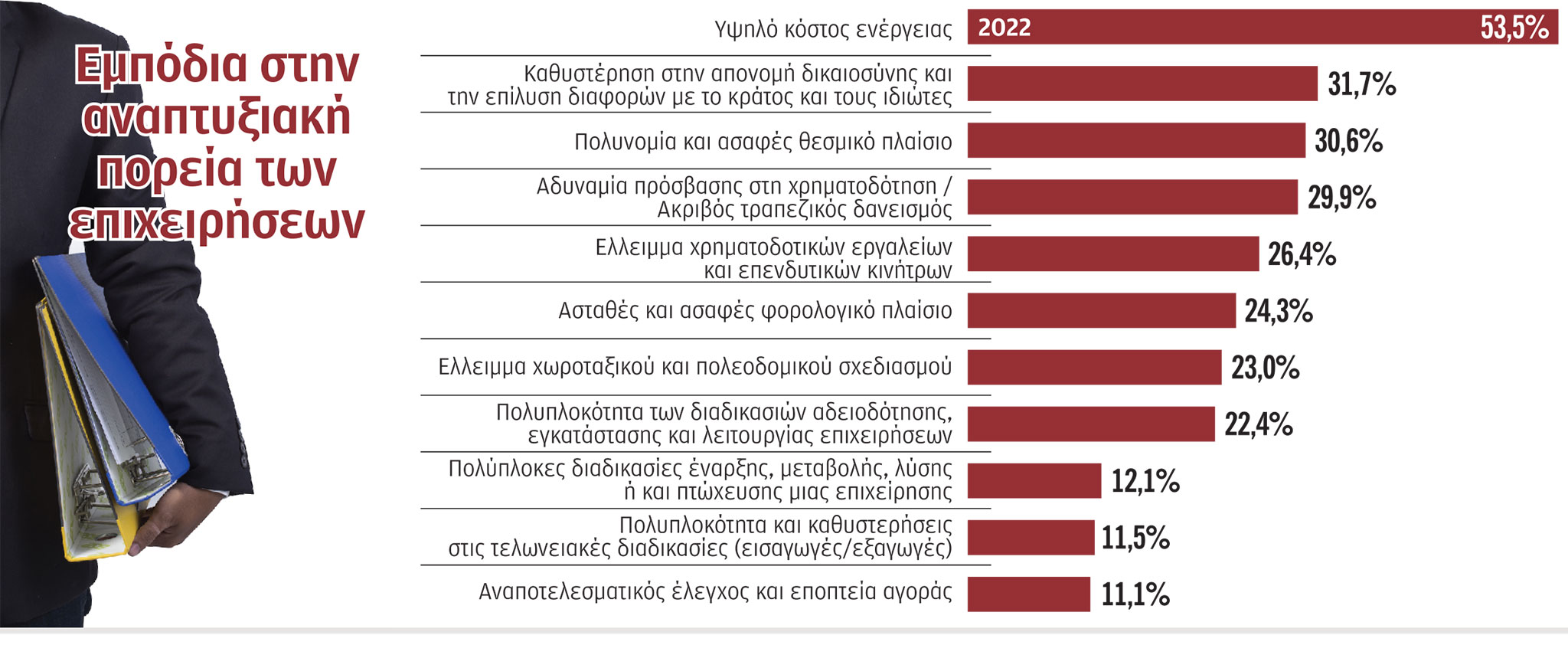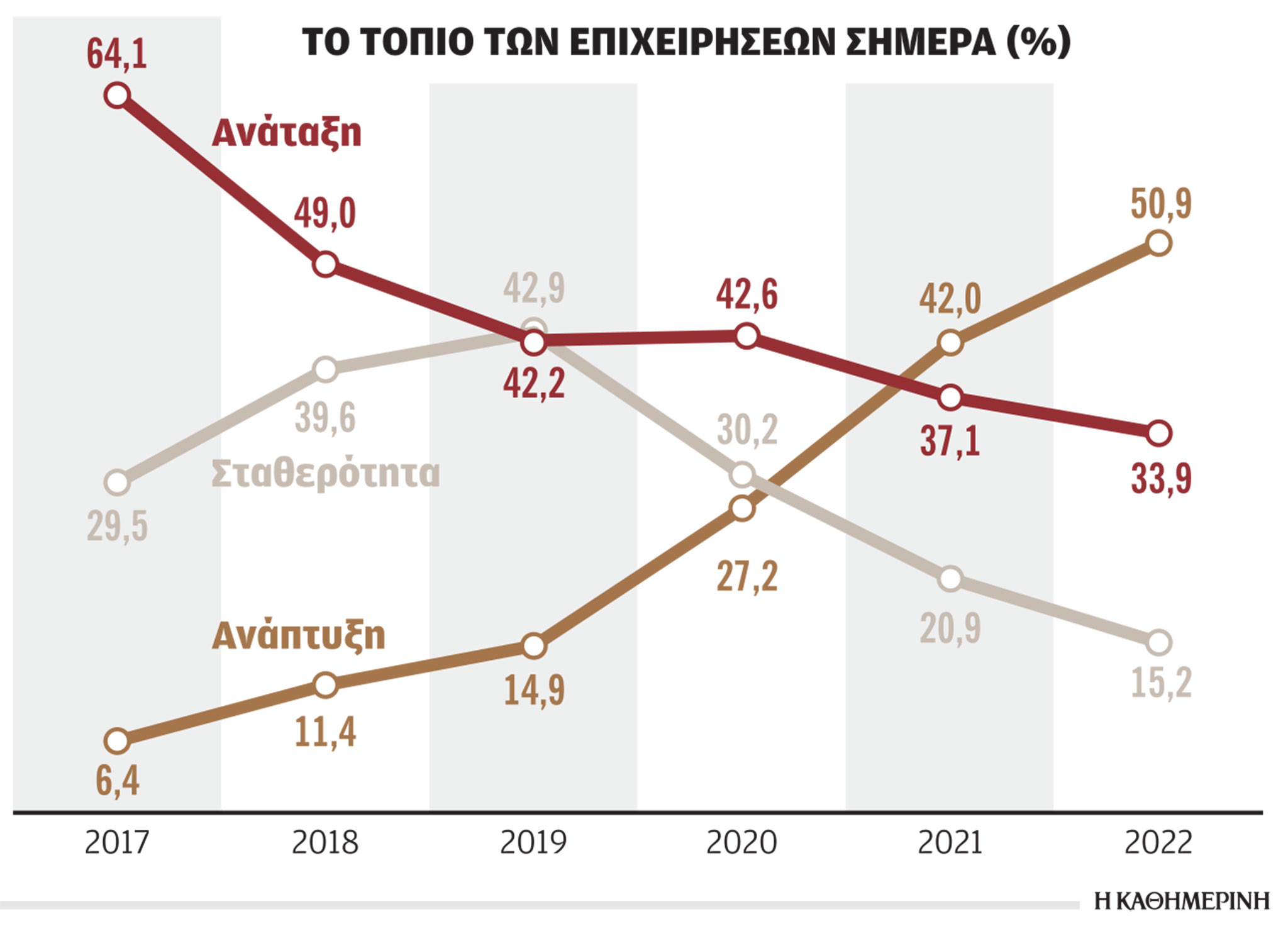
Her business development more than half are now looking for or expecting enterprises in the country, leaving behind attempts to simply survive in a series of crises that hit it Greece and the world economy. On the other hand, a critical percentage of companies, almost one in three, are still trying to lay off staff. Basically, they are just trying to survive, which is a difficult task, since they are lagging behind in investments, and the road to financing is paved with … thorns. In the middle is another category of companies with clearly more stable bases, but significantly dependent on the situation.
How We Came To Growth-Driven Businesses Now Make Up Almost 51% Of Businesses, Up From 42% In 2021 And Just 14.2% In 2019, According To The Annual Survey Business and Industry Association (SEB) under the name “Business Pulse”? In addition to improving the state of the economy after a decade of crisis, business transition into this category, growth, is now happening through the maturation of strategic partnerships, expanding the product portfolio, investments in digital and green transformation and innovation. These features bring economic benefits and make it easier for businesses to respond to growing demand. They also add a qualitative change from a past dominated by modern factors.
How a business “map” is formed according to the annual BSE survey.
Reforms of recent years, such as the digitalization of the state, changes in the tax regime and the acceleration of implementation NSRF. However, unfortunately, this is not enough, especially since chronic pathologies persist, such as the slowness of the administration of justice, the lack of integrated spatial planning, the absence of special spatial frameworks for a number of branches of economic activity, the functioning, or rather dysfunction, of local self-government organizations Municipalities, which in many cases have remained in the old, outdated model of bureaucratic organization, with only a few clear examples of digital transformation.
In addition to the structural problems of public administration, Greek businesses have been facing a new crisis, the inflationary crisis, for more than a year now, with energy costs ranking as the top hurdle for all business categories in the survey.
OUR survey “Pulse of business” carried out by the company MRB Hellas on behalf of the BSE, it was held from 09/22/2022 to 10/27/2022 and 591 enterprises participated in it.

STABILITY
They took advantage of the opportunities created by the pandemic
They have weathered the crises and are looking to stabilize their business performance not so much through innovative products and processes, but by capitalizing on the opportunities created by the pandemic. These are enterprises with a basic expectation of stability, mainly small enterprises, which account for 15.2%, while their share has decreased significantly over the past three years, since it was 42.9% in 2019.
Although they enjoy the benefits of public resources (ESRA, etc.), their investment activity is limited. In particular, according to the survey, 49% took advantage of EU resources. however, to cover their investment needs, only 25.8% continue their investments without interruption, and 57% do not have or plan any investment activity in the future.
52% see green transition as important to growing their business, with 34.2% linking green transition to addressing climate change and 31.3% to lower energy costs.
28.9% attribute their expectation of stability to using current opportunities due to the pandemic, a higher percentage of those who attribute their expectation of stability to investing in innovative products and processes by expanding their portfolio of products and services (27%).
High tax rates for businesses and individuals, pressure on competitiveness due to energy costs and inefficient functioning of institutions such as the judiciary and independent bodies are the main obstacles for this category of enterprises at the macroeconomic level. It is worth noting that as the fifth main obstacle with a percentage of 23%, they consider the political uncertainty associated with the fact that these are businesses with a not so stable foundation, which largely depend on the current situation. Business, for example, with growth prospects, rates political uncertainty as a problem only in 11th place from 5%.
RECOVERY
They are struggling to get out of the recession spiral
They may not make up the majority of businesses, as they did in 2017 when they accounted for 64.1% when the country still had a MoU, but today they still make up a critical percentage of 33.9%. These are the businesses that are the first to expect cutbacks, mostly businesses that are struggling to get out of the recession spiral and are struggling to survive daily, mostly small and very small businesses that have been hit by the pandemic crisis. and inflationary, but at the same time bearing the brunt of a decade-long economic crisis.
Of particular interest is the fact that although they represent investment activities, they do not include green and digital investments. Not coincidentally, moreover, they use community funds more as working capital and only 17.2% of enterprises as investment support. However, 55.8% consider the green transition to be important, and 44.5% believe that the benefits considered are limited to reduced energy costs and energy efficiency.
27% attribute their desire for restructuring directly to the positive economic development of the country, which is mainly due to high dependence on the domestic market due to a limited international presence.
The high cost of energy is also the main problem for this category of enterprises (58.7%), followed immediately by the difficulty of accessing bank financing (58.6%). The third most serious obstacle is the lack of financial instruments and investment incentives (51.9%), while the plurality and fuzziness of the institutional framework is also considered a significant problem (45.8%).
The main obstacle at the macroeconomic level is considered to be high tax rates for individuals and legal entities, followed by lack of transparency in the country and corruption (41.4%), as well as the pressure on competitiveness due to energy costs (36.2%). Enterprises in this category rate political uncertainty as the eighth most important obstacle to their development.

development
They use community resources for investment
“Investment” is the key word for companies that, according to the survey, are among those whose main expectation is business growth. That is why, after all, 71% used EU resources. to cover his investment needs. Also, 35.3% continue to invest, strengthen their investment activities and intend to continue it more intensively in the future. However, there are also 24.7% who temporarily postponed their investment activities, planning to re-evaluate them after the end of the geopolitical crisis. Another element that sets them apart is that a significant percentage (23.2%) associate their development with digital and green transformation. With regard to the latter, it is worth noting that 67.8% of specific companies consider the green transition to be very important for their development, and 62.2% consider specific investments necessary to safely manage and process upcoming climate change risks, in contrast to up to 46 % who perceive them as an opportunity to reduce energy consumption and energy efficiency.
The path to development is not easy and not easy, especially the companies belonging to this category have an international presence, which means a greater dependence on what happens outside of Greece. At the macroeconomic level, they consider the burden of their competitiveness from energy costs (37%), the international economic and political environment such as war, etc. as the main obstacles. (34.4%), corruption and lack of transparency in Greece (22.4%), and in fourth place is the problem that more and more sectors are facing as a result of the brain drain and the post-pandemic “big layoff” phenomenon, i.e. . lack of free human resources (19.5%).
At the microeconomic level, the main obstacles are considered to be the high cost of energy (48%) and, unfortunately, the far from temporary phenomenon of delays in the administration of justice and the resolution of disputes between the state and private parties (22.5%). ).
They call for continued reforms and measures to reduce energy costs.
The digital portal gov.gr is good, but it would be even better if the procedures were limited and simplified, perhaps at the expense of greater interoperability of systems or not repeating the submission of even digital supporting documents that the public administration already has. Among other things, this is indicated by companies in the context of the BSE investigation in terms of evaluating reforms, but also the presence of many obstacles to their further development.
In addition, as the survey highlights, although the interfaces of enterprises with public services are evaluated positively, especially the services of gov.gr, GEMI, KEP and Ergani, there is a widespread need for a structural simplification of daily life in important public services, such as the public employment service, customs, courts, urban planning, etc. Thus, in addition to energy costs, which are considered the main obstacle for all three categories of business at present (53.5%), the next “pull” is the delay in the administration of justice (31.7%) followed by short distance, polynomiality and fuzzy institutional framework (30.6%). Satisfaction with interaction with the courts is gaining the lowest percentage, only 2.7%, with customs immediately worse (5%). Below 10% are urban planners with a satisfaction rate of 6.3%, regulators (6.1%), but unfortunately for strategic investments and exports, Enterprise Greece (5.2%).
On the other hand, the most important aspects of the reform work of recent years are, in addition to the digitalization of the state (where the positivity index increased from 46.9% in 2020 to 65.1% in 2022), the NSFR programs with the positivity index now stands at 33, 5% from 21.5% in 2020, corporate taxation with an increase in the positivity index to 25.8% from 12% in 2020 and employee taxation with an increase in the positivity index to 24.7% from 14.2% in 2020.
In conclusion, the entire market, in order to maintain a fragile balance of development, mainly due to the uncertain international environment, considers it necessary to take decisive measures to reduce energy costs and continue reforms, especially those aimed at reducing bureaucracy and speeding up the administration of justice.
Source: Kathimerini
Lori Barajas is an accomplished journalist, known for her insightful and thought-provoking writing on economy. She currently works as a writer at 247 news reel. With a passion for understanding the economy, Lori’s writing delves deep into the financial issues that matter most, providing readers with a unique perspective on current events.